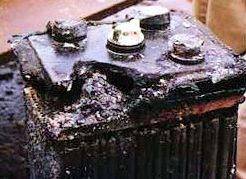Batteries
Batteries store sulfuric acid electrolytes and electrical energy that may cause an explosion and personal injury if suddenly released.

Defective batteries are very dangerous.
When working with batteries:
- Cover batteries stored in boxes as sources of emergency power with a non-conductive rubber mat under the lid of the box.
- Fit battery boxes with vents directed away from air inlets and sources of ignition.
- During the change out of batteries, avoid naked flames and sparks in the immediate vicinity of the battery.
- Chock batteries in their storage boxes to prevent movement under tow.
- Do not lift batteries by their terminals.
- Have plenty of ventilation, wear all required protective clothing and eyewear, remove jewelry, and exercise caution.
- Specialty or non-conductive tools should be considered when performing maintenance on batteries.
- Follow the manufacturer's instructions for testing, jumping, installing, and charging all batteries.
- Only use spirit (alcohol) thermometers when measuring a battery's temperature.
- All lead acid, NiCad, and lithium batteries should be disposed of in accordance with all local, state, and federal regulations. Recycle these batteries as universal waste under the company's waste management plan.
Knowledge Check Choose the best answer for the question.
1-8. What kind of tools must be used when performing maintenance on batteries?
You forgot to answer the question!
